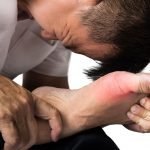Current Diabetes Screening Could Be Missing High Risk Patients
Node Smith, ND
A recent study calls into question the current recommended guidelines for screening for prediabetes and type 2 diabetes.1 The current recommendations advocate screening for diabetes based on only age and weight, which could be missing up to half (50%) individuals, who have other high-risk factors, and up to 70% of certain ethnic groups – Asians.
Half of the U.S. population is affected by prediabetes and diabetes, and these two diseases alone account for roughly $327 billion per year. Failing to screen high-risk populations could be delaying treatment to prevent disease and contributing to this epidemic.
Half of the U.S. population is affected by prediabetes and diabetes
The United States Preventative Task Force (USPSTF) currently recommends screening for diabetes in patients between 40 and 70 years old who are overweight or obese. The current study, which looked at over 50,000 patients in a general practice scenario over a period of five(5) years, estimates that by following this recommendations over half(50%) of prediabetes and diabetes would not even be screened for. The USPSTF does have an expanded list of risk factors – family history of diabetes, gestational diabetes, PCOS, or non-white race or ethnicity – but does not firmly recommend screening with presence of these risk factors. These additional risk factors would identify most cases – the study found that only 23 percent of prediabetes or diabetes would be missed if these risk factors were used in making screening decisions.
It is the hope of the authors that it will inform the USPSTF to update its recommendations
The study was published on April 13, 2018, in the Journal of General Internal Medicine, and it is the hope of the authors that it will inform the USPSTF to update its recommendations. This is the first study to report how these changes to current recommendations could perform in a nationally representative sample of adults.
Addressing blood sugar dysregulation (prediabetes/diabetes) early offers a more favorable long term prognosis
It is known that addressing blood sugar dysregulation (prediabetes/diabetes) early offers a more favorable long term prognosis. Treatment of these diseases prevents life-threatening disease complications – heart attacks, strokes, kidney failure. Early treatment also has the potential to drastically impact quality of life considerations, as untreated diabetes is known to cause complications such as neuropathy and vision problems.
The most insightful of the expanded risk factors is in the ethnic and racial disparities of diabetes presentation
Perhaps the most insightful of the expanded risk factors is in the ethnic and racial disparities of diabetes presentation. African-Americans and Latinos tend to develop type 2 diabetes younger. Beginning screening only after 40 years is incredibly problematic in these populations. In addition, Asian individuals were found to be much more likely to develop diabetes or be prediabetic at normal weights. The study saw that in an Asian population, screening based on overweight or obesity missed approximately 70 percent of cases.
Source:
- O’brien MJ, Bullard KM, Zhang Y, et al. Performance of the 2015 US Preventive Services Task Force Screening Criteria for Prediabetes and Undiagnosed Diabetes. J Gen Intern Med. 2018
Image Copyright: <a href=’https://www.123rf.com/profile_utah778′>utah778 / 123RF Stock Photo</a>
 Node Smith, ND, is a naturopathic physician in Portland, OR and associate editor for NDNR. He has been instrumental in maintaining a firm connection to the philosophy and heritage of naturopathic medicine among the next generation of docs. He helped found the first multi-generational experiential retreat, which brings elders, alumni, and students together for a weekend camp-out where naturopathic medicine and medical philosophy are experienced in nature. Four years ago he helped found the non-profit, Association for Naturopathic ReVitalization (ANR), for which he serves as the board chairman. ANR has a mission to inspire health practitioners to embody the naturopathic principles through experiential education. Node also has a firm belief that the next era of naturopathic medicine will see a resurgence of in-patient facilities which use fasting, earthing, hydrotherapy and homeopathy to bring people back from chronic diseases of modern living; he is involved in numerous conversations and projects to bring about this vision.
Node Smith, ND, is a naturopathic physician in Portland, OR and associate editor for NDNR. He has been instrumental in maintaining a firm connection to the philosophy and heritage of naturopathic medicine among the next generation of docs. He helped found the first multi-generational experiential retreat, which brings elders, alumni, and students together for a weekend camp-out where naturopathic medicine and medical philosophy are experienced in nature. Four years ago he helped found the non-profit, Association for Naturopathic ReVitalization (ANR), for which he serves as the board chairman. ANR has a mission to inspire health practitioners to embody the naturopathic principles through experiential education. Node also has a firm belief that the next era of naturopathic medicine will see a resurgence of in-patient facilities which use fasting, earthing, hydrotherapy and homeopathy to bring people back from chronic diseases of modern living; he is involved in numerous conversations and projects to bring about this vision.










